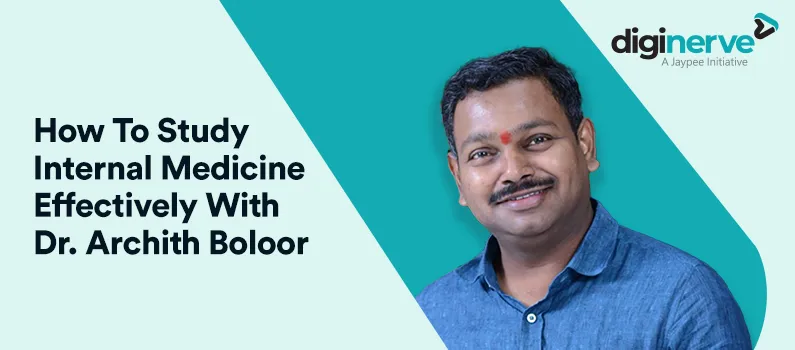Internal medicine, also known as general medicine, is a branch that specialises in the treatment, diagnosis, and preventive measures for various internal diseases ranging from neurology, cardiology, and gastroenterology – with several more. Students may often struggle with their internal medicine course as it covers a vast range of topics and thus, is often taxing to study. However difficult it may seem at first, it is very important as it builds a solid foundation for your life as a doctor and can also be rewarding once you know how to study internal medicine. This easy method of absorbing knowledge can come with Dr. Archith Boloor, the associate professor of medicine at Kasturba Medical College, and the author of three textbooks. Dr. Boloor’s expertise in the subject combined with years of field knowledge provides a comprehensive understanding of any internal medicine course. Further, his study tips for medical students are prized possessions as he himself has won several notable awards and achievements. To help any student looking to learn how to study medicine effectively, here are some tips:
1. Keep Track of Ward Patients – One study tip for medical students studying their shelf exam would be to continuously take rounds around the wards, providing an excellent opportunity to familiarise oneself with a variety of diseases, symptoms, and then learn their treatment plan. The natural structure of the ward that combines a variety of medical branches into one location can act as a physical representation of any internal medicine course.
2. Study From Multiple Sources – By referencing different textbooks and combining this knowledge with practical experience, students can effectively study their internal medicine course. By comparing various sources, students can fact-check as well as see the practical implementation of a theoretical treatment, allowing for a more holistic internal medicine study guide.
3. Use Rotation Time – Most students who are unsure of how to study medicine effectively ignore the valuable time available during rotations. Apart from using the actual ward as a method of studying, students can also keep flashcards with quick questions and answers, or one-page comprehensive notes, to revise during small breaks or slow hours. Some more study tips for medical students include saving these little pockets of time for the hardest information to retain. By breaking down this tough information into smaller sizes and then repeating them throughout the day, all students will be able to remember what they previously struggled with.
4. Studying Medical Charts – The internal medicine shelf exam often includes questions based on examples of patient charts, their physical exam results, and ECGs to test a student’s knowledge. For those on rotation looking for how to study internal medicine, this is the best method! Keep reviewing real patient medical charts to understand not only the structure in which the information is displayed to doctors, but also to learn common diseases and their symptoms.
For whichever internal medicine course students may be struggling with, these tips will undoubtedly boost their productivity and increase efficiency. For more information on courses taught by Dr. ArchithBoloor, click here to view Diginerve’s exam prep course.

